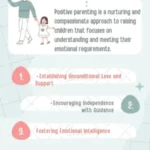Parenting, a profound journey laden with myriad ups and downs, often feels akin to navigating an emotional rollercoaster. As parents, our well-intentioned words shape the landscape of our children’s experiences. However, certain phrases, passed down through generations or exchanged between parents, might unknowingly create rifts rather than bridges.
The Hurdles of Well-Meaning Phrases
1. Stop Conversation:
“Because I said so.”
“You’ll understand when you’re older.”
“You’ll thank me later.”
“You’re too young to understand.”
“When you’re a parent, you’ll understand.”
These phrases, intended to assert authority or conclude discussions efficiently, may inadvertently send a message that only the parent’s viewpoint matters. Rather than encouraging open dialogue, it may create a belief in children that their opinions can be dismissed, fostering a narrow perspective.
2. Threats:
“Stop crying, or I’ll give you something to cry about.”
“Wait until your father/mother gets home.”
Using threats as a means of persuasion in parent-child relationships can jeopardize a child’s sense of safety. Unlike friends who can walk away from a threatening situation, children lack that freedom within their familial bonds. The result is an environment of fear and instability that significantly impacts a child’s mental health.
3. Unfair Comparison:
“When I was your age…”
“Back in my days…”
“You don’t know how good you have it.”
While aimed at providing alternative viewpoints, such comparisons might leave children feeling misunderstood or dismissed. Their unique circumstances may make it challenging to relate to the experiences of previous generations, causing confusion rather than imparting meaningful lessons.
4. Oversimplified Comparison:
“If all your friends jumped off a cliff, would you do it, too?”
“If your friends decided to rob a bank, would you join them?”
Parents sometimes resort to oversimplified analogies to dissuade certain behaviors. However, using unrealistic comparisons can create confusion and mixed messages, making it difficult for children to understand the gravity of their choices.
5. Social Comparison:
“Why can’t you be more like your friend?”
“That’s why I like your sister more.”
Drawing social comparisons with siblings or friends may backfire, leading to diminished intrinsic motivation and decreased academic performance in children. Constant exposure to such comparisons can have long-lasting negative effects on a child’s self-esteem.
6. Superiority:
“I’m not your friend, I’m your parent.”
“I am the parent, and you are the child.”
“As long as you live under my roof, you’ll follow my rules.”
Statements emphasizing parental authority, while intended to establish boundaries, might implicitly suggest that parents need not treat their children kindly or fairly. The power imbalance implied can hinder the development of mutual respect in the parent-child relationship.
7. Dismissive:
“It’s OK. It’s a small thing.”
“No, it doesn’t hurt.”
“It’s no big deal.”
Downplaying the severity of situations may not provide the comfort parents intend. Invalidating children’s feelings is linked to emotion dysregulation, leading to mental health issues and externalizing behaviors in teenagers.
Building Bridges Through Transformative Parenting
In our journey as parents, it’s vital to reevaluate our communication strategies. Instead of relying on phrases that may inadvertently create distance, we can adopt approaches that foster deeper connections and understanding.
1. Open Dialogue:
Encourage open communication with your children. Rather than shutting down discussions, create an environment where their opinions are valued. Acknowledge their perspectives and engage in conversations that promote understanding.
2. Positive Reinforcement:
Shift from threats to positive reinforcement. Encourage good behavior through praise and constructive feedback. Building a nurturing environment fosters a child’s sense of safety and encourages positive mental health.
3. Contextual Comparisons:
When sharing past experiences, ensure the comparisons are relevant to your child’s context. Help them draw meaningful lessons by connecting historical anecdotes to their present circumstances.
4. Realistic Analogies:
Utilize realistic analogies that resonate with your child’s experiences. Clear and relatable comparisons will help them grasp the consequences of their choices without causing confusion.
5. Individual Recognition:
Avoid constant social comparisons and instead focus on recognizing each child’s unique strengths. Celebrate individual achievements, fostering a positive environment that encourages intrinsic motivation.
6. Mutual Respect:
Emphasize mutual respect in the parent-child relationship. While maintaining authority, treat your children with kindness and fairness. This approach builds trust and contributes to a healthier parent-child dynamic.
7. Validate Feelings:
Acknowledge and validate your child’s feelings, even if the situation seems trivial. Creating a space where emotions are recognized helps in developing emotional regulation skills, contributing to long-term mental well-being.
Conclusion
Parenting is a transformative journey that requires constant adaptation. By reevaluating our communication strategies and steering away from phrases that may inadvertently create distance, we can build bridges of understanding. Transformative parenting nurtures deeper connections, fostering an environment where children thrive emotionally and mentally.





